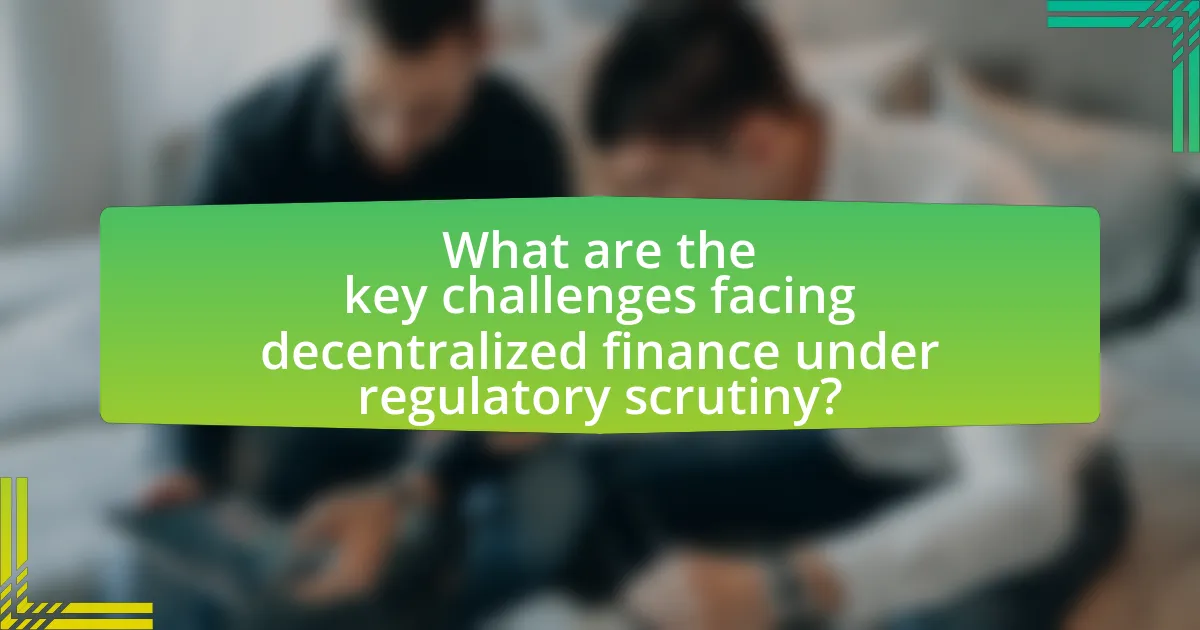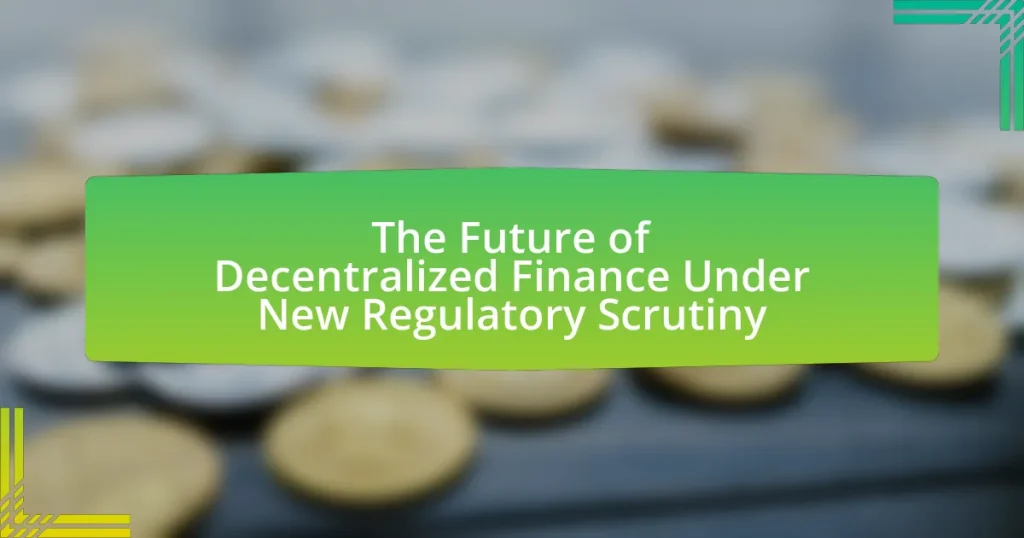Decentralized finance (DeFi) is increasingly facing regulatory scrutiny as global authorities seek to ensure consumer protection and prevent financial crimes. This article examines the implications of new regulations on DeFi, highlighting the potential for increased compliance requirements, the redefinition of operational frameworks, and the challenges posed by varying regulations across jurisdictions. Key topics include the impact of regulatory measures on innovation, user trust, and the overall landscape of decentralized finance, as well as strategies for DeFi platforms to navigate compliance challenges while maintaining their core principles. The discussion also explores future prospects for DeFi amidst evolving regulatory environments and the opportunities that may arise from a more structured financial landscape.

What is the Future of Decentralized Finance Under New Regulatory Scrutiny?
The future of decentralized finance (DeFi) under new regulatory scrutiny is likely to involve increased compliance requirements and potential restructuring of business models. Regulatory bodies worldwide, such as the U.S. Securities and Exchange Commission (SEC), are focusing on ensuring consumer protection and preventing fraud, which may lead to stricter guidelines for DeFi platforms. For instance, the SEC has already indicated that many tokens offered in DeFi may be classified as securities, necessitating registration and compliance with existing securities laws. This shift could result in a more regulated environment that balances innovation with consumer safety, ultimately shaping the evolution of DeFi to align with traditional financial systems while maintaining its core decentralized principles.
How is decentralized finance defined in the context of regulatory scrutiny?
Decentralized finance (DeFi) is defined in the context of regulatory scrutiny as a financial system that operates without central intermediaries, utilizing blockchain technology to facilitate transactions and services. Regulatory bodies are increasingly focusing on DeFi due to concerns about consumer protection, anti-money laundering (AML), and the potential for systemic risks, as evidenced by the rise in enforcement actions and proposed regulations targeting DeFi platforms. For instance, the Financial Action Task Force (FATF) has issued guidelines emphasizing the need for compliance with AML standards in the DeFi space, highlighting the importance of regulatory oversight to mitigate risks associated with unregulated financial activities.
What are the key characteristics of decentralized finance?
Decentralized finance (DeFi) is characterized by its reliance on blockchain technology, enabling peer-to-peer transactions without intermediaries. This structure promotes transparency, as all transactions are recorded on a public ledger, allowing users to verify and audit activities. Additionally, DeFi platforms often utilize smart contracts, which automate processes and reduce the need for trust in third parties. The accessibility of DeFi is another key characteristic, as it allows anyone with an internet connection to participate, regardless of geographical location or financial status. Furthermore, DeFi operates on open-source protocols, fostering innovation and collaboration within the ecosystem. These characteristics collectively contribute to the disruption of traditional financial systems, offering users greater control over their assets and financial activities.
How does regulatory scrutiny impact the definition of decentralized finance?
Regulatory scrutiny significantly impacts the definition of decentralized finance (DeFi) by introducing compliance requirements that can alter its foundational principles. As regulators seek to impose rules on financial activities, the essence of DeFi, which emphasizes autonomy and minimal oversight, may shift towards a more centralized framework to meet legal standards. For instance, the Financial Action Task Force (FATF) has recommended that DeFi platforms implement Know Your Customer (KYC) and Anti-Money Laundering (AML) measures, which could redefine the operational landscape of DeFi by necessitating user identification and transaction monitoring. This regulatory pressure can lead to a re-evaluation of what constitutes DeFi, potentially blurring the lines between decentralized and traditional finance as platforms adapt to remain compliant while striving to retain their decentralized ethos.
Why is regulatory scrutiny becoming more prevalent in decentralized finance?
Regulatory scrutiny is becoming more prevalent in decentralized finance due to increasing concerns about consumer protection, financial stability, and the potential for illicit activities. As decentralized finance platforms grow, they attract significant capital and users, prompting regulators to address risks associated with fraud, market manipulation, and lack of transparency. For instance, the Financial Action Task Force (FATF) has emphasized the need for compliance with anti-money laundering (AML) and combating the financing of terrorism (CFT) regulations, which has led to heightened oversight in the sector. Additionally, incidents such as the collapse of major crypto exchanges have underscored the necessity for regulatory frameworks to safeguard investors and maintain market integrity.
What events have triggered increased regulatory attention on decentralized finance?
Increased regulatory attention on decentralized finance has been triggered by several high-profile incidents, including significant hacks, fraud cases, and the collapse of major projects. For instance, the $600 million hack of the Poly Network in August 2021 highlighted vulnerabilities in DeFi protocols, prompting regulators to scrutinize security measures. Additionally, the collapse of Terra’s algorithmic stablecoin, UST, in May 2022 resulted in substantial financial losses for investors, raising concerns about the stability and risk management of DeFi platforms. These events have led to calls for clearer regulatory frameworks to protect consumers and ensure market integrity.
How do regulatory bodies perceive the risks associated with decentralized finance?
Regulatory bodies perceive the risks associated with decentralized finance (DeFi) as significant due to concerns over consumer protection, market integrity, and financial stability. These entities highlight issues such as the potential for fraud, lack of transparency, and the absence of regulatory oversight that traditional financial systems have. For instance, the Financial Stability Board (FSB) has noted that the rapid growth of DeFi could pose systemic risks if left unregulated, particularly in areas like liquidity and leverage. Additionally, the U.S. Securities and Exchange Commission (SEC) has expressed concerns regarding the classification of tokens and the potential for securities violations, emphasizing the need for clear regulatory frameworks to mitigate these risks.
What potential changes can we expect in decentralized finance due to regulatory scrutiny?
Regulatory scrutiny is likely to lead to increased compliance requirements and operational transparency in decentralized finance (DeFi). As governments and regulatory bodies seek to mitigate risks associated with fraud, money laundering, and consumer protection, DeFi platforms may need to implement Know Your Customer (KYC) and Anti-Money Laundering (AML) protocols. For instance, the Financial Action Task Force (FATF) has recommended that virtual asset service providers adhere to these standards, which could compel DeFi projects to adapt their operations. Additionally, regulatory frameworks may push for greater interoperability with traditional financial systems, potentially resulting in centralized elements within DeFi platforms to ensure compliance. This shift could alter the foundational ethos of DeFi, which emphasizes decentralization and autonomy.
How might regulations alter the operational landscape of decentralized finance?
Regulations may significantly alter the operational landscape of decentralized finance by imposing compliance requirements that could limit the autonomy and innovation inherent in decentralized systems. For instance, regulatory frameworks may necessitate Know Your Customer (KYC) and Anti-Money Laundering (AML) protocols, which could centralize aspects of decentralized finance platforms and reduce user anonymity. Additionally, regulations could lead to increased scrutiny and oversight of decentralized applications, potentially stifling the rapid development and deployment of new financial products. Historical examples, such as the implementation of the Financial Action Task Force (FATF) guidelines, illustrate how regulatory measures can reshape operational practices within the cryptocurrency sector, compelling platforms to adapt or face penalties.
What are the implications for innovation within decentralized finance?
The implications for innovation within decentralized finance (DeFi) include increased regulatory compliance, enhanced security measures, and the potential for new financial products. As regulatory scrutiny intensifies, DeFi platforms must innovate to meet compliance requirements, which may lead to the development of more robust identity verification and anti-money laundering protocols. For instance, the implementation of decentralized identity solutions can enhance user privacy while satisfying regulatory demands. Additionally, the need for improved security against hacks and exploits drives innovation in smart contract auditing and insurance products, as evidenced by the rise of firms specializing in DeFi security audits. Furthermore, regulatory frameworks may encourage the creation of novel financial instruments that align with legal standards, fostering a more sustainable and trustworthy DeFi ecosystem.

What are the key challenges facing decentralized finance under regulatory scrutiny?
The key challenges facing decentralized finance (DeFi) under regulatory scrutiny include compliance with existing financial regulations, the risk of increased oversight leading to reduced innovation, and the potential for fragmentation of the DeFi ecosystem. Compliance with regulations such as anti-money laundering (AML) and know your customer (KYC) requirements poses significant hurdles for DeFi platforms, which traditionally operate without centralized control. Increased regulatory oversight may stifle innovation, as developers may hesitate to create new products that could fall under regulatory scrutiny. Additionally, varying regulations across jurisdictions can lead to fragmentation, making it difficult for DeFi projects to operate globally. These challenges highlight the tension between the decentralized nature of DeFi and the structured requirements of regulatory frameworks.
How do compliance requirements affect decentralized finance projects?
Compliance requirements significantly impact decentralized finance (DeFi) projects by imposing regulatory obligations that can alter their operational frameworks. These requirements often necessitate the implementation of Know Your Customer (KYC) and Anti-Money Laundering (AML) protocols, which can hinder the pseudonymous nature of DeFi, potentially reducing user participation. For instance, the Financial Action Task Force (FATF) has recommended that jurisdictions enforce regulations that require DeFi platforms to identify users, which can lead to increased operational costs and complexity for these projects. Additionally, compliance can limit the innovation and speed of development within DeFi, as projects may need to allocate resources to meet regulatory standards rather than focusing on technological advancements.
What specific compliance challenges do decentralized finance platforms face?
Decentralized finance platforms face significant compliance challenges primarily due to the lack of clear regulatory frameworks. These platforms often operate in a legal gray area, making it difficult to adhere to existing financial regulations such as anti-money laundering (AML) and know your customer (KYC) requirements. For instance, the decentralized nature of these platforms complicates the identification of users, which is essential for compliance with AML laws. Additionally, the rapid evolution of technology outpaces regulatory responses, leading to uncertainty about which regulations apply. This situation is exacerbated by the global nature of decentralized finance, as different jurisdictions have varying regulations, creating further complexity for compliance efforts.
How can decentralized finance projects navigate these compliance challenges?
Decentralized finance projects can navigate compliance challenges by implementing robust Know Your Customer (KYC) and Anti-Money Laundering (AML) protocols. These protocols help ensure that projects adhere to regulatory requirements, thereby reducing the risk of legal repercussions. For instance, a study by the Financial Action Task Force (FATF) emphasizes the importance of KYC and AML measures in mitigating risks associated with financial crimes in the crypto space. Additionally, engaging with legal experts and regulators can provide clarity on evolving regulations, allowing projects to adapt their operations accordingly. By proactively addressing compliance through these strategies, decentralized finance projects can foster trust and legitimacy in a scrutinized regulatory environment.
What risks do decentralized finance platforms encounter with new regulations?
Decentralized finance platforms encounter significant risks with new regulations, primarily including compliance costs, operational disruptions, and potential loss of user trust. Compliance costs arise as platforms must invest in legal and technical resources to meet regulatory requirements, which can strain their financial viability. Operational disruptions may occur as platforms adjust their systems and processes to align with new rules, potentially leading to service outages or reduced functionality. Additionally, if users perceive that regulations compromise the decentralized ethos of these platforms, it could result in a loss of trust, driving users away and diminishing market participation. These risks are underscored by the increasing scrutiny from regulatory bodies worldwide, as seen in the European Union’s Markets in Crypto-Assets Regulation, which aims to impose stricter oversight on crypto activities.
How might regulatory risks impact user trust in decentralized finance?
Regulatory risks can significantly undermine user trust in decentralized finance (DeFi) by creating uncertainty around the legality and security of these platforms. When governments introduce stringent regulations or threaten to impose bans, users may perceive DeFi as a risky investment, leading to decreased participation. For instance, the U.S. Securities and Exchange Commission’s actions against certain DeFi projects have raised concerns about compliance and the potential for legal repercussions, which can deter users from engaging with these platforms. Additionally, regulatory scrutiny can lead to increased operational costs for DeFi projects, potentially resulting in reduced innovation and service quality, further eroding user confidence.
What are the financial implications of non-compliance for decentralized finance platforms?
Non-compliance for decentralized finance platforms can lead to significant financial penalties, loss of market access, and increased operational costs. Regulatory bodies may impose fines that can reach millions of dollars, as seen in cases like the SEC’s actions against various crypto entities, which have resulted in penalties exceeding $1.5 billion collectively. Additionally, non-compliance can restrict access to banking services and partnerships, limiting liquidity and operational capabilities. The uncertainty surrounding regulatory frameworks can also lead to increased costs for compliance measures, as platforms may need to invest heavily in legal and compliance teams to navigate evolving regulations.

How can decentralized finance adapt to new regulatory environments?
Decentralized finance can adapt to new regulatory environments by implementing compliance measures that align with existing laws while maintaining its core principles of decentralization. This adaptation may involve the integration of Know Your Customer (KYC) and Anti-Money Laundering (AML) protocols into decentralized platforms, allowing them to operate within legal frameworks without compromising user privacy. For instance, projects like Aave and Uniswap have explored governance models that incorporate regulatory compliance, demonstrating that decentralized protocols can evolve to meet regulatory demands while still providing financial services. Additionally, collaboration with regulators can foster a better understanding of decentralized finance, leading to more informed and supportive regulatory frameworks.
What strategies can decentralized finance platforms implement to ensure compliance?
Decentralized finance platforms can implement several strategies to ensure compliance, including the integration of robust Know Your Customer (KYC) and Anti-Money Laundering (AML) protocols. By adopting KYC measures, platforms can verify the identities of their users, which helps prevent illicit activities and aligns with regulatory requirements. Additionally, implementing AML practices allows platforms to monitor transactions for suspicious activities, thereby reducing the risk of regulatory penalties.
Furthermore, utilizing smart contracts that incorporate compliance checks can automate adherence to regulations, ensuring that all transactions meet legal standards before execution. Regular audits by third-party firms can also enhance transparency and accountability, providing evidence of compliance efforts to regulators. These strategies collectively help decentralized finance platforms navigate the evolving regulatory landscape effectively.
How can technology facilitate compliance in decentralized finance?
Technology can facilitate compliance in decentralized finance by implementing automated regulatory reporting and real-time transaction monitoring. Smart contracts can be programmed to enforce compliance with regulatory requirements, ensuring that transactions adhere to legal standards without manual intervention. For instance, blockchain technology provides an immutable ledger that allows for transparent auditing and tracking of transactions, which is essential for regulatory oversight. Additionally, decentralized identity solutions can enhance Know Your Customer (KYC) processes, enabling platforms to verify user identities while maintaining privacy. These technological advancements not only streamline compliance processes but also reduce the risk of fraud and enhance trust among users, aligning decentralized finance with evolving regulatory frameworks.
What role do partnerships play in achieving regulatory compliance?
Partnerships play a crucial role in achieving regulatory compliance by facilitating knowledge sharing and resource pooling among organizations. These collaborations enable firms to stay informed about evolving regulations and best practices, which is essential in the rapidly changing landscape of decentralized finance. For instance, partnerships with legal experts and compliance consultants can provide insights into specific regulatory requirements, helping organizations to implement necessary changes effectively. Additionally, joint efforts in compliance initiatives can lead to the development of standardized practices that enhance overall industry compliance, as seen in sectors like banking and finance where collaborative frameworks have been established to meet regulatory demands.
What best practices should decentralized finance projects adopt in response to regulatory scrutiny?
Decentralized finance projects should adopt transparency, compliance with local regulations, and robust security measures in response to regulatory scrutiny. Transparency involves clear communication about project operations, governance, and financial practices, which builds trust with users and regulators alike. Compliance with local regulations ensures that projects align with legal frameworks, reducing the risk of penalties or shutdowns; for instance, adhering to Anti-Money Laundering (AML) and Know Your Customer (KYC) requirements is crucial. Additionally, implementing robust security measures protects user assets and data, which is essential for maintaining user confidence and meeting regulatory standards. These practices collectively help decentralized finance projects navigate the evolving regulatory landscape effectively.
How can decentralized finance platforms maintain transparency with regulators?
Decentralized finance platforms can maintain transparency with regulators by implementing robust reporting mechanisms and utilizing blockchain technology for real-time data sharing. These platforms can establish clear communication channels with regulatory bodies, ensuring that they provide necessary information regarding transactions, user identities, and compliance with financial regulations. For instance, the use of smart contracts can automate compliance checks and reporting, thereby enhancing accountability. Additionally, platforms can adopt industry standards for data privacy and security, which can help build trust with regulators. This approach is supported by the increasing trend of regulatory frameworks globally, such as the European Union’s Markets in Crypto-Assets Regulation, which emphasizes the need for transparency in financial transactions.
What measures can be taken to enhance user education about regulatory changes?
To enhance user education about regulatory changes, organizations can implement targeted training programs and utilize digital platforms for information dissemination. Training programs can include workshops, webinars, and interactive sessions that focus on the specifics of regulatory changes, ensuring users understand their implications. Digital platforms, such as websites and mobile applications, can provide real-time updates, FAQs, and educational resources tailored to user needs. Research indicates that effective user education increases compliance rates and reduces misunderstandings, as seen in studies conducted by the Financial Industry Regulatory Authority, which found that informed users are 30% more likely to adhere to new regulations.
What are the future prospects for decentralized finance amidst regulatory scrutiny?
The future prospects for decentralized finance (DeFi) amidst regulatory scrutiny are likely to involve increased compliance measures and innovation in governance structures. As governments and regulatory bodies worldwide focus on consumer protection and financial stability, DeFi platforms may adapt by implementing Know Your Customer (KYC) and Anti-Money Laundering (AML) protocols. For instance, the Financial Action Task Force (FATF) has emphasized the need for compliance in the crypto space, which could lead to more robust regulatory frameworks. This adaptation may foster greater legitimacy and institutional adoption of DeFi, as platforms that align with regulatory expectations could attract more users and investment.
How might the evolution of regulations shape the future of decentralized finance?
The evolution of regulations will significantly shape the future of decentralized finance (DeFi) by establishing clearer compliance frameworks that enhance legitimacy and security. As governments and regulatory bodies increasingly focus on DeFi, they are likely to implement rules that address issues such as anti-money laundering (AML), consumer protection, and taxation. For instance, the Financial Action Task Force (FATF) has already recommended that countries regulate virtual assets and service providers, which could lead to a more standardized approach across jurisdictions. This regulatory clarity can foster greater institutional investment in DeFi, as firms will feel more secure in participating within a compliant framework. Additionally, regulations may drive innovation by encouraging the development of new technologies that meet compliance requirements, ultimately leading to a more robust and sustainable DeFi ecosystem.
What opportunities could arise from a more regulated decentralized finance landscape?
A more regulated decentralized finance landscape could lead to increased institutional investment. Regulatory clarity can enhance trust among traditional financial institutions, encouraging them to allocate capital to decentralized finance projects. For instance, a report by the World Economic Forum indicates that regulatory frameworks can facilitate the entry of institutional players, which could significantly boost liquidity and market stability in decentralized finance. Additionally, improved consumer protection measures could attract a broader user base, as individuals may feel more secure participating in regulated environments.






